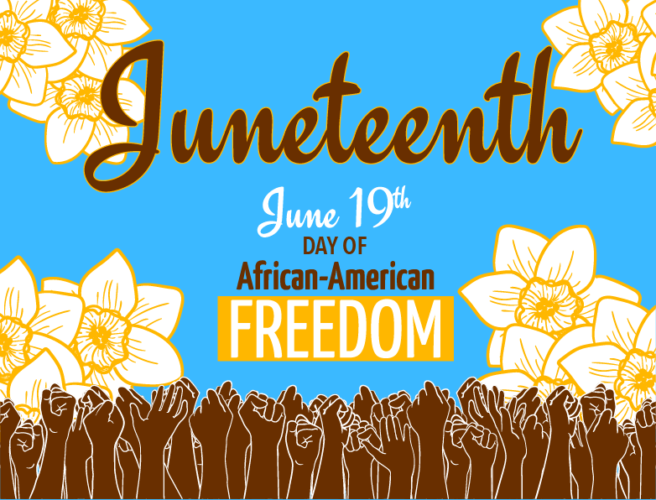Compiled by Kaela Zarkovitch & Tracy Collins, ESD 112 Equity Committee
Juneteenth, an annual holiday commemorating the end of slavery in the United States, honors the legal end of slavery, and has been celebrated by African-Americans since the late 1800s. The holiday received its name by combining June and the date of 19th. The day is also sometimes called “Juneteenth Independence Day,” “Freedom Day,” or “Emancipation Day,” although the language “Independence Day” continues to be a source of discussion. For many African Americans, Juneteenth — and not the Fourth of July’s Independence Day — serves as the day to commemorate a real hope for an equal future. While Juneteenth marks the active end of slavery in the US it is largely unknown and underappreciated a century after its founding.[i]
On April 9, 1864 Confederate general Robert E. Lee formally surrendered to Union troops at Appomattox in Northern Virginia. Most rural areas like Texas and states West of the Mississippi River did not receive this new until June of 1865. On June 19, 1865, in Galveston, TX., Union General Gordon Granger told African American slaves that the Civil War had ended, and that they were free. Granger publicly read General Orders No. 3 to the crowd, announcing the immediate and effective emancipation of about 250,000 remaining slaves:
“The people of Texas are informed that in accordance with a Proclamation from the Executive of the United States, all slaves are free. This involves an absolute equality of rights and rights of property between former masters and slaves, and the connection heretofore existing between them becomes that between employer and hired laborer.”[ii]
The orders also established that the owner/slave dynamic that existed before and during the war would now be employer/employee—and for all labor to be compensated with wages. June 19 was selected to celebrate the actual end of slavery. On that day legal emancipation reached some of the farthest corners of the country, and African Americans saw a complete, legal release from slavery. Juneteenth marks the earliest promise of justice.
The announcement came more than 2.5 years after Abraham Lincoln issued the Emancipation Proclamation of Jan 1, 1863. The Emancipation Proclamation was a pivotal moment in American history, [as] one of the first times a human-rights cause was championed on an executive scale. Few people know that the Emancipation Proclamation was issued twice. The first reading, on September 22, 1862, served as Lincoln’s original attempt to convince Confederate states to rejoin the Union. [iii] Following the announcement, former slaves left Texas looking for family members or more welcoming accommodations in the north, this period was known as “the scatter.”
A series of “Black Codes” put into effect after the Civil War restricted the civil and economic opportunities of newly freed African Americans. These codes created impediments for African Americans to receive building or festival permits, congregate during certain hours, and live, work, or engage in social activities in certain neighborhoods. Black Codes were a fundamental reason behind many African Americans purchasing emancipation plots in order to hold Juneteenth festivities, since they could not gather safely in most city parks. Later on, the Jim Crow laws that governed the South through the 1960s provided another heinous example of a lack of equity in the United States. These laws were explicitly discriminatory and marginalizing. They were designed to limit, repress, or make difficult the daily actions and liberties many of us take for granted today—like holding a festival.
Juneteenth’s significance remains relatively unknown throughout the United States: Nearly every school across the nation will discuss the Fourth of July, the Declaration of Independence, the U.S. Constitution, the American Civil War, and the Emancipation Proclamation. But few will delve into the actual timeline of slavery’s abolishment. Juneteenth is lost in this educational gap. Juneteenth holds no such affiliation and is not legally protected. The National Juneteenth Observance Foundation (NJOF), founded in 1997, serves to create nation-wide Juneteenth recognition. The founder and chairman of NJOF, Reverend Ronald V. Myers, still champions the cause two decades after its founding.[iv]
Importance of Juneteenth in 2020
Juneteenth represents a perfect day to honor the contributions of Maya Angelou, Ralph Ellison, Langston Hughes, Alice Walker, James Baldwin, and countless other black writers, celebrating the artistic and creative endeavors of African Americans.[v] These writers and their works acknowledge an important piece of American history, thus promoting the spirit of Juneteenth. With specific periods in African-American cultural history especially fertile for literature, including the Harlem Renaissance (1920-1940) and the Black Arts Movement (1965-1975), reading the work of prominent African-American writers is a good way to celebrate the holiday.
Religious spirituals, or Freedom Songs, and sermon-inspired speeches are common when celebrating Juneteenth. Prayer services and sermons are [also] inherent during Juneteenth. Food is an essential part of most holidays, and Juneteenth is no exception, with the barbecue pit often at the heart of this celebration. Many major U.S. cities host Juneteenth parades or street fairs put together by local organizations, nonprofits, or governments. Some cities even offer educational and civil-engagement opportunities, with many utilizing the spirit of Juneteenth to herald further community involvement with civil rights issues.
In remembering Juneteenth, we rally around a day where community and resilience can shine. Galveston remains the site of the largest Juneteenth celebrations – the city usually has about 15 events, including parades, barbecues, musical performances and a beauty contest, beginning the first week of June. Texas became the first state to designate Juneteenth as a holiday In 1980, this is a larger symbolic recognition, as it has fallen short of becoming a national holiday. In 2019, New Hampshire became the latest state to declare Juneteenth a state holiday[vi]. Forty-seven of the 50 states recognize Juneteenth as a state holiday or special day of observance.[vii]
Celebrating Juneteenth is both celebratory and reflective, with the potential to galvanize further social change. Memorializing Juneteenth doesn’t just occur in parades and barbecues. Understanding racism throughout all American history is an important way to mark the occasion.[viii] This year, there is a renewed interest in the day that celebrates freedom to African Americans as there are some comparisons between the end of the Civil War to current protests in the U.S. and abroad. Mark Anthony Neal, an African-American studies scholar at Duke University, “The stakes are a little different,” [for] many African-Africans, [it] feels as though this is the first time in a long time that they have been heard in a way across the culture.”
Additional Resources for Juneteenth
Articles:
https://www.mentalfloss.com/article/501680/12-things-you-might-not-know-about-juneteenth
https://www.tolerance.org/magazine/teaching-juneteenth
https://www.nytimes.com/2020/06/09/us/juneteenth-twitter-square-holiday.html
https://www.nytimes.com/article/juneteenth-day-celebration.html?searchResultPosition=4
Books for all ages:
https://coloursofus.com/10-childrens-books-celebrating-juneteenth/
https://blackbooksmatter.com/celebrate-juneteenth-with-three-great-kids-books/
https://feministbooksforkids.com/5-childrens-books-about-juneteenth/
https://blackandbookish.com/blog/top-ten-tuesday-juneteenth-books-for-all-ages
https://www.penguinrandomhouse.com/the-read-down/juneteenth
Podcast:
YouTube/TedTalk:
https://www.youtube.com/watch?v=K3aQjTy328o
Virtual Events:
https://www.eventbrite.com/e/juneteenth-nyc-with-arts-station-tickets-107745142622?aff=erellivmlt
[v] ibid
[vi] Taylor, D. B. 6.13.20. So You Want to Learn About Juneteenth? NYTimes. Retrieved 6.13.20 from: https://www.nytimes.com/article/juneteenth-day-celebration.html?searchResultPosition=4
[vii] Wikipedia, Juneteenth. Retrieved 6.14.20 from: https://en.wikipedia.org/wiki/Juneteenth#:~:text=Juneteenth%20is%20recognized%20as%20a,47%20of%20the%2050%20states.
[viii] Ibid


Thank you for this well written, informative piece and for the list of references!
Thank you Kaela Zarkovitch & Tracy Collins for writing and sharing this piece. I appreciate the education you are providing to me and so many others.
Thank you Tracy & Kaela and the Equity Committee for sharing this educational and moving information and all of the resources! Thank you for doing this most important work to promote equity and anti-racism efforts within our ESD and community. I have marked
June Teenth on my calendar as a (reoccurring) holiday, so I will never forget to honor this very important day!
correction to my comment, I meant: Juneteenth
Thank you for educating me more on this important day.
Thank you, Kaela, Tracy, and Equity Team. This is a very important piece of history that we all need to learn more about. I appreciate you bringing this information forward and sharing it with all of us.